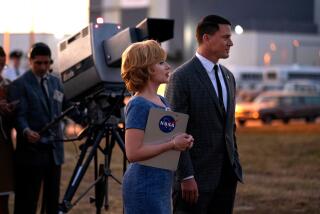25 Years After Moonwalk, a Starry Salute : Anniversary: At White House, President praises Apollo 11 astronauts and the promise of that 1969 mission. But some fear the pioneer spirit has waned.
- Share via
WASHINGTON — Twenty-five years after American astronauts left their footprints in the lunar dust and on human history, President Clinton on Wednesday commended the first moon explorers and the U.S. space program for expanding the horizons of science and the imaginations of a generation of children.
Saying that the veterans of the Apollo 11 mission “realized the dreams of a nation” the day Neil Armstrong announced that he had taken “one small step for a man, one giant leap for mankind,” Clinton used the White House ceremony commemorating the first lunar landing to demonstrate support for the current space program, which has been riddled with cost overruns and charges of mismanagement.
Armstrong, fellow moonwalker Edwin (Buzz) Aldrin and Michael Collins, who circled the moon in the command ship, Columbia, while his colleagues went to the moon’s surface on the lunar lander, Eagle, took center stage in front of a giant photograph of Aldrin standing on the bleak, gray surface of the moon.
“During the Space Age, we have increased the knowledge of our universe a thousandfold,” said Armstrong, now a graying electronics executive. Turning to a group of science students, he said: “We leave you much that is undone. There are great ideas undiscovered, breakthroughs available to those who can remove one of truth’s protective layers. There are places to go beyond belief.”
But some former astronauts and National Aerospace and Space Administration officials voiced doubts about whether Americans will ever reach those places, saying that the silver-anniversary celebration underscores a lack of vision and commitment to space exploration.
In breakfast remarks to members of Congress and former astronauts, Aldrin bemoaned “a withered capacity for wonder and a growing retreat to delusions of a risk-free society” that he said have overtaken what were once bright-eyed visions of space travel.
Eugene Kranz, who served as Apollo 11’s flight controller, said in a television interview Wednesday that failure to follow up lunar landings with construction of a permanent moon station is “like Columbus discovering America and then deciding never to come back.”
But Clinton assured the Apollo 11 explorers and the 18 other Apollo astronauts attending the White House ceremony that “our commitment to the space program is strong and unwavering. The best way to honor these men and all the others who have helped us so much is to continue that quest.
“Looking back on that mission, one thing is clear that we ought to remember today--it wasn’t easy,” Clinton said.
The historic 1969 flight came close to failure when a computer that was supposed to safely maneuver the tiny landing craft, which measured only 13 feet in diameter, brought the vehicle dangerously close to a crash.
Armstrong took over the controls and touched down on the moon with only 20 seconds of fuel remaining. NASA navigators 250,000 miles away in Houston heaved a sigh of relief when they heard a garbled transmission: “the Eagle has landed.”
As many as 1 billion people watched on television as America cemented its triumph over the Soviet Union in a space race born of the Cold War.
But, in a sign that today’s scientists are hoping for greater international cooperation in future space exploration, two Russian cosmonauts were among the guests at the White House ceremony.
Members of the House Science, Space and Technology Committee--who earlier in the day had approved a bill authorizing construction of the $14-billion space station--also filed into the East Room ceremony after their vote.
Clinton said that the project would hasten discoveries in medicine and other fields, bolster the aerospace industry and inspire young people to follow in the footsteps of Armstrong, Aldrin and their moonwalking colleagues.
Some already have a head start.
“At first, I didn’t really believe people could go to the moon,” said Kristina McNeill, a 12-year-old student from Wilmington, N.C., who attended the ceremony with her classmates from the Young Astronaut science program. “I do want be an astronaut someday.”
* MEMORIES OF MOONWALK: Angelenos recall where they were when Eagle landed. B1
More to Read
Sign up for Essential California
The most important California stories and recommendations in your inbox every morning.
You may occasionally receive promotional content from the Los Angeles Times.













